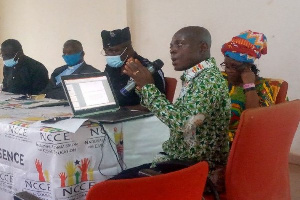 The forum being organised by the National Security
The forum being organised by the National Security
The National Commission for Civic Education (NCCE) in collaboration with National Security have commenced public education and sensitisation forum against extremism and terrorism for the citizenry to deny support for such socio-political threat in the society.
The forum being organised by the National Security with funding from the Ministry of National Security is urging the populace, particularly the youth and residents at border towns and districts to reject support and recruitment into violent acts, extremisms, and execution of terrorists’ ideologies.
It is a nationwide exercise with the maiden edition held at Sampa, in the Jaman North District of the Bono region.
Participants were representatives of youth groups, the Ghana Federation of Disability Organisations, the New Patriotic Party and National Democratic Congress, religious leaders, and heads of security agencies drawn from Sampa and its environs.
Major (Rtd.) Osei Agyemang, the Bono Regional Security Co-coordinator, in a presentation said the objective of the project was to empower the Ghanaian populace to eschew secessionism movements and their related consequences and embrace “national cohesion and inclusive participation in governance to promote peaceful coexistence.”
This, he said was crucial because of intelligence gathered by the national security and the focus of the project was on the highly suspicious areas.
Major (rtd.) Agyemang stated “extremists use and influence the unemployed youth to carry out their criminal and other nation-wrecking activities”, hence, the National Security and NCCE were working assiduously with opinion leaders in educating and sensitising the public on the menace.
In an earlier presentation, Mr. Peter Gyasi, the Deputy Bono Regional Director of NCCE highlighted some consequences of violent acts, saying they included threats to the sovereignty of the state and its resultant national insecurity – political and socio-economic instability that could bring holistic national development to a halt.
Mr Gyasi identified marginalisation of minority groups, religious and political intolerance as well as denial of individuals’ rights as some major factors that caused conflict and the associated violent acts in communities.
He said that contradicted the essence of Article 35 (5) of the 1992 Fourth Republican Constitution that provided that regardless of political, ethnic, and religious affiliation, it was the duty of all citizens to foster national unity for the benefit of all.
Mr Gyasi said that provision, therefore, enjoined the citizenry to promote unity for absolute peace and harmony of the state and stressed that acts of disunity to cause mayhem and instability in the country must not be entertained.